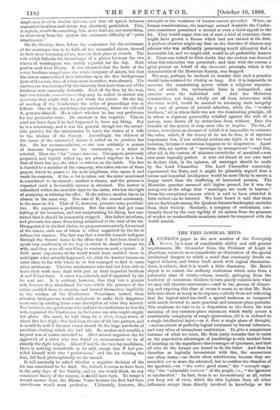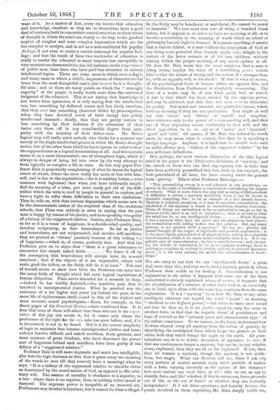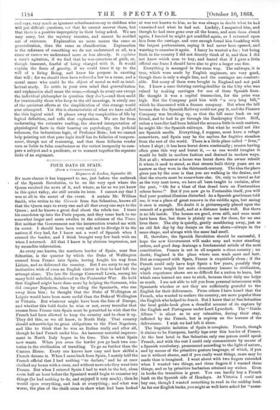THE THIN LOGICAL MIND.
ACURIOUS paper in the new number of the Fortnightly Review, by a man of considerable ability and still greater acquirements, Mr. Alexander Bain, the Professor of Logic in Aberdeen, seems to us so remarkable an illustration of the special intellectual dangers to which a mind that constantly dwells on logical fallacies, and busies itself much with logical discrimina- tions, is subject, that it is worth a little discussion. Mr. Bain's object is to correct the ordinary confusions which arise from a particular class of errors,—those, namely, springing from the tendency of inaccurate thinkers to turn purely relative into what we may call absolute statements ;—and in the process of dissect- ing and exposing this class of errors it seems to us that Mr. Bain falls into about as many as he exposes,—chiefly from not reflecting that the logical mind has itself a special weakness as compared with minds devoted to more practical and common-place pursuits. This weakness we take to be a disposition to thin down the true meaning of any common-place statement which really covers a considerable complexity of rough observation, till it is reduced to a single intellectual layer,—as it were a single plane of thought, —and so admits of perfectly logical treatment by formal inference, and very often of triumphant confutation. To give a conspicuous instance of what we mean, Mr. Bain justly remarks that to insist on the superlative advantages of knowledge is only another form of insisting on the superlative disadvantages of ignorance, and that all who do the former are bound to do the latter. And then he describes as logically inconsistent with this, the encomiums one often hears,—no doubt often mischievous, because they are intended not to warn the educated, but to confirm the blunders of the ignorant,—on "the native good sense," the "untaught saga- city," the "admirable instincts" of the people, i.e., "the ignorant or uneducated." In fact, there is no inconsistency at all, unless you keep out of view, which the thin logician does, all other influences except those directly involved in knowledge or the want of it. As a matter of fact, every one knows that education and knowledge, excellent as they are in themselves, have a good deal of tendency both to concentrate mental attention on those trains of thought in which the mind can clearly see its way, to the gradual neglect of rougher and more complex impressions which are far too complex to analyze, and to act as a non-conductor for popular feelings, if not even to excite a certain contempt for popular feel- ings; and that the result of these two tendencies of education is really to render the educated in many respects less susceptible to very momentous characteristics, say, for instance, in the temperament of public men, than those who have paid less attention to minute intellectual topics. There are some cases in which even a dog's, and many cases in which a child's, impressions of character are far truer than the most thoughtful man's, just because he is a thought- ful man ; and so there are many points on which the " untaught sagacity" of the people is really worth more than the cultivated judgment of the educated. This is not saying that knowledge is not better than ignorance, it is only saying that the intellectual -may lose something by dullened senses and less lively emotions, that they must lose something (however little) by preoccupation, when they have diverted much of their energy into purely intellectual channels ; finally, that they are pretty certain to lose something by their isolation if the education of their tastes cuts them off in any considerable degree from sym- pathy with the majority of their fellow-men. Mr. Bain's logical trap will really catch nobody who thinks for a moment not merely of the single intellectual groove in which Mr. Bain's thought moves, but of the other facts which he has to ignore in order to treat the supposed error as a logical inconsistency at all. And this mistake seems to us a most characteristic one of triumphant logic, which is always in danger of being led into error by the very attempt to treat logically so complex a life as ours. In this very paper Pro- fessor Bain is perpetually complaining of what he deems the logical errors of others, where the error really lies more or less with him- self, and is due to the superstition,—for it is nothing better,—(too common with logicians) that when you have arbitrarily simpli- fied the meaning of a term, you have really got rid of the diffi- culties which the term is used by people in general to expie,ss, and have a right to refer those difficulties to their own confusions. Thus he tells us, with that curious dogmatism which seems now to be the characteristic rather of the sceptical than of the credulous schools, that Plato was entirely in error in saying that the just man is happy by reason of his justice, and in so speaking was guilty . of a fallacy of the suppressed relative. Justice, says Professor Bain, . so far as it is a cause of happiness, is a double-sided quality, and .involves reciprocity, as does benevolence. So far as justice and benevolence are not reciprocated, and involve self-sacrifices, they are praised as 'virtues' precisely because of this willing /oss of happiness;—which is, of course, perfectly true. And then the Professor goes on to argue that "there is a great reluctance to
-encounter this simple naked truth We fence it off by the assumption that benevolence will always have its reward
• somehow ; that if the objects of it are ungrateful, others will make good the defect, or the Deity will do it at least." This sort -of remark seems to show how little the Professor can enter into the many folds of thought which foil most logical expositions of human obligation. Plato never intended for a moment to deny, —indeed, he has vividly depicted,—the sensitive pain that is involved in unreciprocat,ed justice. What he asserted was the -existence of a far higher and purer joy behind the pain, in the .mere life of righteousness itself ;—and in this all the highest and most accurate moral psychologists,—Kant, for example, in the .finest pages of his Practical Reason,—have confirmed him. It is true that none of them will admit that those who act in the expec- .tation of this joy can secure it, for it comes only where the preference of the right for its own sake has gone before, and, if it is discounted, is not to be found. But it is the merest simplicity of logic to maintain that because uureciprocated justice and bene- volence involve difficult and naked sacrifices, those greatest, and most accurate of great thinkers, who have discerned the purest .sort of happiness behind such sacrifices, have been guilty of the fallacy of a "suppressed relative."
Professor Bain is still more dogmatic and much less intelligible, .(for here his logic becomes so thin that it pares away the meaning of the words he uses till they scarcely have a meaning) when he nays, "It is a fallacy of the suppressed relative to describe virtue -as determined by the moral nature of God, as opposed to His arbi- trary will. The essence of morality is obedience to a superior, to law : where there is no superior, there is nothing either moral or immoral. The supreme power is incapable of an immoral act. Parliament may do what is injurious, but it cannot do what is illegal. So the Deity may be beneficent or maleficent, Ile cannot be moral or immoral." We have read that sort of thing a hundred times before, but it appears to us either to have no meaning at all, or to involve a revolution in the meaning of words which no school of philosophy has any right to demand. If it means anything, it asserts that a sincere atheist, or a man without the conception of God or any being more powerful than himself, might take delight in the torture of the lower animals or of his own children, without coming within the proper meaning of any moral epithet at all. Or does Mr. Baia mean that the mere suspicion that a man is doing wrong implies the voice of a forbidding power within
him ?—that the notion of wrong and the notion of a stronger than he, with an opposite will, is identical ? If that is what he means, all the psychological facts of human ethics are against him, and the illustration from Parliament is absolutely unmeaning. The laws of a realm may be of any kind, good, bad, or mixed.
A law is that which has been created by the supreme power, and may be enforced, and this does not even tend to determine its quality. But moral and immoral are qualitative terms, which
have no meaning if they are not qualitative. You might as well say that ' sweet ' and bitter,' or ' round ' and angular,' have reference only to the power of a commanding will, and that one of these adjectives means conformity to that will, and the other opposition to it, as, say so of moral' and
' good ' and 'evil.' Of course, if Mr. Bain has defined his words anew, he may mean what is correct, but then he is speaking a foreign language. Anyhow, it is hard that lie should make such
an awful offence as a "fallacy of the suppresed relative" by his own arbitrary definitions.
But, perhaps, the most curious illustration of the thin logical mind in the paper is the Professor's definition of mystery,' and his attack on those who can find any mystery left in facts that have been perfectly generalized into law, such as, for example, the best generalized of all facts, the facts coining under the general term 'gravity.' This is what Professor Bain says :—
"This generalizing sweep is a real advance in our knowledge, an ascent in the scale of intelligence, a step towards centralizing the empire of science. What is more, this is the only real meaning of EXPLANATION: A difficulty is solved, a mystery unriddled, when it can be shown to resemble something else ; to be an example of a fact already known. Mystery is isolation, exception, or it may be apparent contradiction ; the resolution of the mystery is found in assimilation, identity, fraternity. When all things are assimilated, so far as assimilation can go, so far as likeness holds, there is an ond to explanation ; there is an end to what
the mind can do, or can intelligently desire Before Newton, it was a mystery what kept the moon awl the planets in their places ; the assimilation with falling bodies was the solution. But, say many persons, is not gravity itself a mystery ? We say no ; gravity has passed through all the stages of legitimate and possible explanation ; it is the most highly generalized of all physical facts, and by no assignable transformation could it be made more intelligible than it is. It is sin- gularly easy of comprehension ; its law is exactly known ; and, except- ing the details of calculation, in its more complex workings, there is nothing to complain of, nothing to rectify, nothing to pretend ignorance about ; it is the very pattern, the model, the consummation of know- ledge."
We are sorry to say that we can 'intelligently desire' a great deal more than this, and that we do find a mystery precisely where Professor Bain scolds us for finding it. Generalization is not explanation at all, unless it happens that some one of the facts assimilated is already explained, when, of course, it happens that the identification of a number of other facts with it, as essentially one in kind, open them with the same hey,—give to them the same explanation. It is a " mystery " to us how Mr. Bain or any other intelligent observer can regard the word " moral" as meaning "obedient to the highest power,"—but when we have once found. out that he does so, it is no further mystery, only the same in another form, to find that he regards dread of punishment and hope of reward as the "primary germ and characteristic type" of the infant conscience. So we cannot, in the least, understand how Newton cleared away all mystery from the action of gravity, by identifying the centripetal force which keeps the planets in their orbits with that which brings the apple to the earth. All gene- ralization can do is to reduce thousands of mysteries to one; if that one continues no longer a mystery, but can be, in any relative sense, explained, then they are all so far explained. If not, then they all remain a mystery, though the mystery is not multi- form, but single. What can Newton tell me, when I ask why every particle of matter attracts every other particle of matter with a force varying inversely as the square of the distance? how mere matter can exert force at all ? why we are so apt to identify force and life? whether, if this be erroneous, force proceeds out of life, or life out of force? or whether they are mutually independent? If I ask these questions, and humbly declare the points involved in them mysteries, Mr. Bain simply scolds me,
and says, very much as ignorant schoolmasters say to children who 'will put difficult questions, not that he cannot answer them, but that there is a positive impropriety in their being asked. We are very sorry, but the mystery remains, and cannot be scolded out of existence. Explanation no more means the same as
generalization, than the same as classification. Explanation is the reference of something we do not understand at all, to a cause or causes we understand more or less already. It explains a man's agitation, if we find that lie was conscious of guilt, or, though innocent, fearful of being charged with it. It would explain the force of gravity, if we could trace it up to the will of a living Being, and know his purpose in exerting that will ; for we should then have reduced a law to a cause, and a moral cause who could be the object of moral as well as intel- lectual study. To settle in your own mind that generalization and explanation shall mean the same,—though to every one except the individual philosopher in question they don'I,—and then scold for irrationality those who keep to the old meanings, is surely one of the quaintest efforts at the simplification of this strange world ever attempted. Yet this is characteristic of what we have called the thin logical mind. It planes away the complexities of life by logical definition, and calls that explanation. We are far from underrating the extensive reading, the shrewd interpretation of physiological facts in their bearing on psychology, the judicial calmness, the industrious logic, of Professor Bain ; but we cannot help pointing out that pure logic itself has its fallacies of tempera- ment, though not of reasoning, and that these fallacies render men as liable to false conclusions as the veriest incapacity to com- pare a subject and a predicate, or to connect together the separate links of an argument.




































 Previous page
Previous page